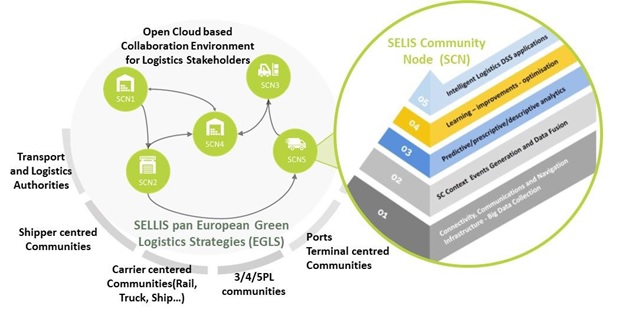
Setting a Shared European Logistics Information Space to improve Supply Chain visibility
Supply chain systems interoperability has emerged to improve access to and use of complete and timely information, to automate an efficient interaction between shippers, logistics service providers and authorities and to improve visibility and decision making. The objective is to provide seamless exchange of information between different participants processes, irrespectively of the underlying ICT systems used. SELIS, which stands for “Shared European Logistics Information Space”, establishes a collaborative information and business environment for all EU logistics stakeholders. The objective is to offer improved interoperability, advanced collaboration and reduced costs.

SELIS offers to different logistics stakeholder communities as shown in Figure 1 better ways to share and use information. More precisely, logistics stakeholders manage their business processes in the most efficient, safe and green way whilst maintaining absolute control of their own data.
The SELIS Concept and approach
SELIS is a network of logistic communities’ intelligent information spaces that are termed, defined as the SELIS Community Nodes (SCN). SCNs are developed by individual logistics communities to facilitate the next generation of collaborative, responsive and agile green transportation chains. SCNs link with their participants’ existing systems through a secure infrastructure and provide shared information and tools for data acquisition and use, according to a ‘cooperation agreement’. Connected nodes, provide a distributed common communication and navigation platform for Pan European logistics applications. SCNs are powered by Big Data Analytics, feeding green logistics Decision Support Applications.
Each supply chain actor develops secure unified communications infrastructure that is common among the community. This service provides integration of data (business, sensor, satellite, etc.) that is elastic, software defined, content based and follows the publish – subscribe decentralised approach (information pull approach). Each node participant decides what information wishes to publish and what information wants to subscribe to. A SELIS node is not a B2B aggregator platform in the traditional sense, but a focused supply chain community one. This way the obstacles of large scale data and system integration are avoided and a low cost entry to collaborative supply chain management for green logistics can be realised. Conceptually, SELIS is a single data source on the cloud, consisting of distributed connected data sources, participant’s databases, public web sites etc. As more logistical information is added, SELIS will enable improved planning and improved supply chain execution.
The SELIS Business Innovation Opportunity
The role of logistics is shifting from simply controlling the goods flows to the integrated management, coordination and control of information, material, financial, and energy flows. This creates a need for new business models that foster stakeholder cooperation. There are significant opportunities for Supply Chain Actors, including:
- Cooperative business models that can be executed online and offline, using dynamic simulation, based on captured information flows of logistics information, that drive joint decisions and collaborations at a strategic level;
- Integration of public authorities (e.g. customs, national systems including Single Windows), and private entities such as port community systems in logistics cloud environments and enhanced Business – Government collaboration;
- Semantically enabled information exchange models feeding interoperability-on-demand for message exchanges, with continuous flows of sensor based information and IoT devices;
- Change management processes that strengthen business resilience and increase collaboration responsiveness, and impact oriented strategies, aligned with technology innovation
Authors, Tsampieris Nikos and Koliousis Ioannis
